Yet one more reason to check in to Alex Itin’s remarkable blog if you haven’t recently or ever. As you may have read here several weeks ago, alex started a group on Flickr, The Library Project, for people to post works that have been created by two or more artists, building serially on each other’s efforts. Last October Alex posted a beautiful video he made as an homage to the mystical Alpine light know as die alpen lumen. In a nod to the exquisite corpse form of The Library Project, a Japanese artist, Eat A Bug, posted a film he made in response. Serious kudos to alex and all his fellow artists who are demonstrating the power of collaboration and remix culture.
Category Archives: Blogosphere
ITIN place | 2007 redux: design journal, parts 1 & 2
ITIN place — May 2006 archives (left two columns with live links):
[1] SUMMER 2006
At the beginning of the summer, Ben Vershbow, Alex Itin, and I began to discuss a redesign of IT IN place‘s archives. Itin blogs prolifically, his posts rich with media: scans of paintings, animated .gifs, Vimeo linked video collages. As a result, at present, his blog archive is enormous, slow loading, and unweildy. The archive requires better display and search capabilities—a map— to foreground the sheer volume of Itin’s work, rather than bury it. Below is a series of exchanges, both visual and conversational, following the redesign of IT IN place‘s archives…
blogs and time (links for 11.1.06)
Interesting links that crossed my path over the past few days that I haven’t time to post on (and likely never will):
- “French publishers join fight against Google Book Search”: Le Syndicat National de l’édition (SNE), a trade association of French publishers, has joined a suit brought against Google by the Le Martiniè re conglomerate in August for “counterfeiting and breach of intellectual property rights” in its book digitization program.
- outside.in is a new web service co-created by Steven Johnson and John Geraci that aggregates blog content according to zip code, giving you a regularly updated guide to where you live. It uses a little Google map as a navigation tool — a dynamic table of contents.
- US intelligence agencies use wikis: The CIA and other agencies have begun using an internal wiki site called the “Intellipedia” where staff post current events updates and colloborate on intelligence assessments, supposedly to avoid repeating mistakes like Iraq WMD. “‘I think in the future you’ll press a button and this will be the NIE,’ said Michael Wertheimer, assistant deputy director of national intelligence for analysis.”
- Clay Shirky on “meganiches”
- Wikipedia and the academy: To contribute or not to contribute? Article in Chronicle of Higher Ed. on the fraught relationship between academics and the online encyclopedia. Among other things discusses troubling disparity in quality between science articles and humanities articles. Is there a “two cultures” problem in online scholarly collaboration?
- Ehon: The Artist and the Book in Japan: Glorious exhibit at the New York Public Library. A totally different way of thinking about books.
Should if:book serve as a filter and recommender, providing nutritious lists of links like the one above, or purely as a source of original ideas and commentary? If the answer is both, then what should be the ratio of shorter, “pointier” posts to longer, “thinkier” ones? Blogs are agnostic as to the varying size and speed of thoughts — everything goes into the same sinking scroll, soon vanishing into the catacombs of the monthly archives and category pages.
This works fine for news cycle or daily diary-type blogs, but it’s a handicap for a site like ours where longer meditations — the kind that would benefit from longer exposure — are the more common fare, and where extended, multi-post arcs on a relatively small cluster of central ideas are more what constitute the “story” of this blog than any given week’s smattering of entries. As I write, there are several extended conversations taking place within posts that, though only a few days old, are being pushed further and further down the scroll as newer content accumulates. The only hint of their still being active is the “recent comments” link to the right, which is at best an overheard whisper.
Given these constraints, and figuring that it’s the slower moving ideas that matter most, we generally try to avoid posting quick linkdumps like the one above — useful as they might be for annotating our wider web readings and pointing readers to interesting sites — simply because they have the unfortunate effect of pushing the other stuff down. But this only slightly mitigates the still unsolved problem of portraying complex movements of ideas over time on a dinky little blog.
As a side project, we’re thinking about how we could redesign if:book to keep the thinky stuff visible for longer and tied to past related discussions, while also keeping a swift current of useful annotated links and shorter observational posts. This might mean dividing our content into two separate feeds, as on this site.
We’ve also thought about ways to organize content thematically rather than temporally, so what you see at the top isn’t just the newest content, but a cluster of our most important and long-abiding conversations arranged by subject. We’re also considering changes to the individual permalinked pages of posts, perhaps adding dynamically generated links to related posts.
We’ve played around a bit with thematic arrangements on Mitch Stephens’ blog Without Gods. First, just below his banner there’s this tag cloud, which serves as a mental map of Mitch’s writing and interests:
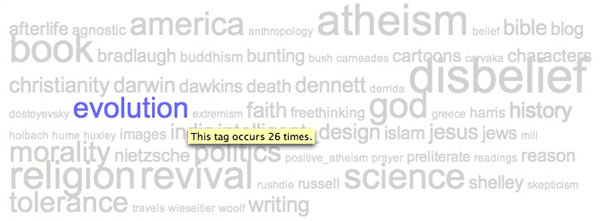
Then there are four side menus with recent posts divided up by general area. “Bonner’s Field” is current events, “Tales of Disbelief” deals with characters in his book, “Thinking Out Loud” is sort of free-form jamming on ideas, and “Book Writer’s Journal” is meta-commentary on the writing process:


I’m also very taken with what this site, an NYU webzine on media and religion called The Revealer. They have a lovely section on the front page that divides articles and blog postings into three distinct tempos, or traffic lanes (which brings us back to the multiple streams/feeds idea):
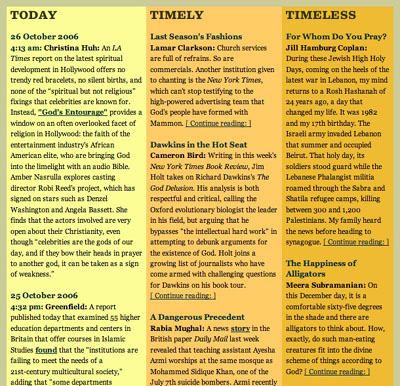
“Time signature” is something we need to add to our design vocabulary for dealing with evolutionary, never-finished documents. Having multiple rates of movement in a single space can create interesting tensions and provide more points of entry to for the reader. I’m hoping we can put some of this into practice with if:book, and soon.
What are other sites that do a good job of handling time? Any other ideas as to how we might do better here?
the library project: a networked art experiment
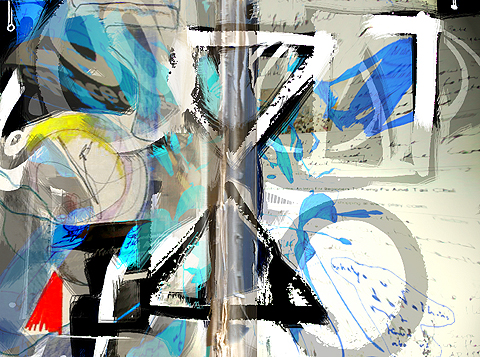
Digital collaboration with me-jade, dou_ble_you and others in the Flickr Library Project
As he recently reflected upon here, Alex Itin has long been working at the border zones of art forms, moving in recent years to the strange intersection of paint and pixels. His blog is one of the most wildly inventive uses of that form, combining blazing low-res images of his paintings with text, photographs, short films, animated GIFs and audio mashups. All of this is done within the constraints of the blog’s scroll-like form — a constraint which Alex embraces, even relishes. I sometimes imagine the scroll endlessly emitting from Alex’s head like tape from a cash register, a continuous record of his transactions with the world.
ITIN place has been on the web for nearly two years now. In his second year, Alex began to explore new avenues out of the blog, establishing a presence on social media sites like Flickr, YouTube, Vimeo (a classier YouTube) and MySpace. Through these networked rovings, Alex has found a larger audience for his work, attracting new “readers” back to the blog where the various transmitted videos and images are reassembled in the scroll. He’s also established relationships with a number of other artists making interesting use of the web, particularly on Flickr and Vimeo. Recently, Alex invited a number of folks from the Flickr community to participate in a collaborative art project — a kind of exquisite corpse game via post. Here’s Alex:
The idea is that one artist takes a hardcover from a book, tears out the pages and draws in one half (or half draws in both halves) of the binder/diptyque. In a nod to Ray Johnson, the two books are mailed (swapped) and Each of these will be finished by the other. The results are posted in a Flicker group called (what else) The Library Project. From this group, hopefully a show will be curated for New York, or Paris, or Basel, or Berlin, or wherever anyone wants to show this project. It should be deliciously portable… get working…get collaborating…get reading!
As of this writing, the Library has racked up 278 members and has 205 images in its pool. A few of these are collaborations that have already made their trek across land, sea and air, others are purely digital combinations, while still others are simply book-inspired works submitted in the spirit of the project.
Alex has been documenting the process on his blog, weaving in some of the images. Styles combine, narratives emerge. In one video (excerpted here) he films himself receiving his first half-completed book from a Canadian artist known as driftwould. He unpacks the drawings and lets out a “wow,” than a sort of humbled sigh. It’s a nice moment of return to the physical world after several years of probing the digital ether.
And here’s how that turned out:
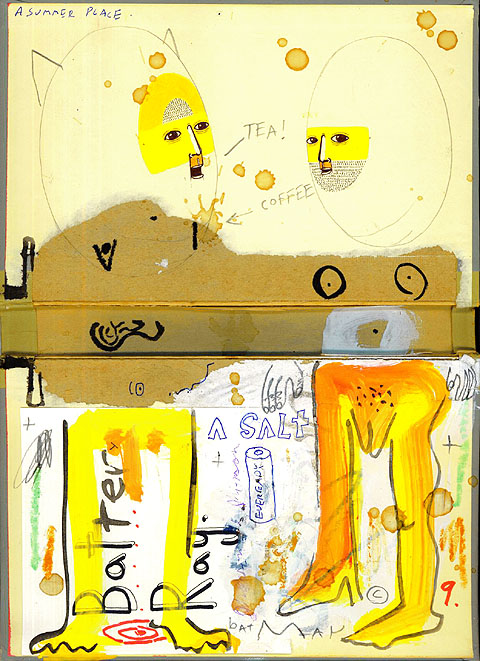
Read Alex’s documentation here and here.
Stay tuned for more — the project has only just begun. Plus, we’ve begun designing a fantastic new interface for Alex’s blog archives, which we’ll talk more about soon.
the role of the filter – a brief appreciation of arts & letters daily

Those of us who are lucky enough to be wired have sadly come to appreciate the impossibility of reading, seeing, hearing, experiencing even a small fraction of just the new entries to the web each day. (yikes, some days it’s even hard just to keep up with a favorite blog). god knows we don’t need more pundits, but we are desperate for reliable filters which can recommend the direction of our attention. Denis Dutton, a philosophy prof in New Zealand started Arts & Letters Daily in 1998. every day since, he (and presumably by now a small staff) have recommended several essays and articles that they think are worth looking at. Unlike a blog however which favors the last entry, Denis’ original design favored short blurbs so that the reader can scan a large number of entries (from several days) fairly quickly. if you don’t know Arts & Letters Daily, it’s worth a look. If you do know it, send Denis and present owner (Chronicle of Higher Education) some fan mail.
on business models in web publishing

Here at the Institute, we’re generally more interested in thinking up new forms of publishing than in figuring out how to monetize them. But one naturally perks up at news of big money being made from stuff given away for free. Doc Searls points to a few items of such news.
First, that latest iteration of the American dream: blogging for big bucks, or, the self-made media mogul. Yes, a few have managed to do it, though I don’t think they should be taken as anything more than the exceptions that prove the rule that most blogs are smaller scale efforts in an ecology of niches, where success is non-monetary and more of the “nanofame” variety that iMomus, David Weinberger and others have talked about (where everyone is famous to fifteen people). But there is that dazzling handful of popular bloggers that rival the mass media outlets, and they’re raking in tens, if not hundreds, of thousands of dollars in ad revenues.
Some sites mentioned in the article:
— TechCrunch: “$60,000 in ad revenue every month” (not surprising — its right column devoted to sponsors is one of the widest I’ve seen)
— Boing Boing: “on track to gross an estimated $1 million in ad revenue this year”
— paidContent.org: over a million a year
— Fark.com: “on pace to become a multimillion-dollar property.
Then, somewhat surprisingly, is The New York Times. Handily avoiding the debacle predicted a year ago by snarky bloggers like myself when the paper decided to relocate its op-ed columnists and other distinctive content behind a pay wall, the Times has pulled in $9 million from nearly 200,000 web-exclusive Times Select subscribers, while revenues from the Times-owned About.com continue to skyrocket. There’s a feeling at the company that they’ve struck a winning formula (for now) and will see how long they can ride it:
When I ask if TimesSelect has been successful enough to suggest that more material be placed behind the wall, Nisenholtz [senior vice president for digital operations] replies, “The strategy isn’t to move more content from the free site to the pay site; we need inventory to sell to advertisers. The strategy is to create a more robust TimesSelect” by using revenue from the service to pay for more unique content. “We think we have the right formula going,” he says. “We don’t want to screw it up.”
***Subsequent thought: I’m not so sure. Initial indicators may be good, but I still think that the pay wall is a ticket to irrelevance for the Times’ columnists. Their readership is large and (for now) devoted enough to maintain the modestly profitable fortress model, but I think we’ll see it wither over time.***
Also, in the Times, there’s this piece about ad-supported wiki hosting sites like Wikia, Wetpaint, PBwiki or the swiftly expanding WikiHow, a Wikipedia-inspired how-to manual written and edited by volunteers. Whether or not the for-profit model is ultimately compatible with the wiki work ethic remains to be seen. If it’s just discrete ads in the margins that support the enterprise, then contributors can still feel to a significant extent that these are communal projects. But encroach further and people might begin to think twice about devoting their time and energy.
***Subsequent thought 2: Jesse made an observation that makes me wonder again whether the Times Company’s present success (in its present framework) may turn out to be short-lived. These wiki hosting networks are essentially outsourcing, or “crowdsourcing” as the latest jargon goes, the work of the hired About.com guides. Time will tell which is ultimately the more sustainable model, and which one will produce the better resource. Given what I’ve seen on About.com, I’d place my bets on the wikis. The problem? You, or your community, never completely own your site, so you’re locked into amateur status. With Wikipedia, that’s the point. But can a legacy media company co-opt so many freelancers without pay? These are drastically different models. We’re probably not dealing with an either/or here.***
We’ve frequently been asked about the commercial potential of our projects — how, for instance, something like GAM3R 7H30RY might be made to make money. The answer is we don’t quite know, though it should be said that all of our publishing experiments have led to unexpected, if modest, benefits — bordering on the financial — for their authors. These range from Alex selling some of his paintings to interested commenters at IT IN place, to Mitch gradually building up a devoted readership for his next book at Without Gods while still toiling away at the first chapter, to McKenzie securing a publishing deal with Harvard within days of the Chronicle of Higher Ed. piece profiling GAM3R 7H30RY (GAM3R 7H30RY version 1.2 will be out this spring, in print).
Build up the networks, keep them open and toll-free, and unforseen opportunities may arise. It’s long worked this way in print culture too. Most authors aren’t making a living off the sale of their books. Writing the book is more often an entree into a larger conversation — from the ivory tower to the talk show circuit, and all points in between. With the web, however, we’re beginning to see the funnel reversed: having the conversation leads to writing the book. At least in some cases. At this point it’s hard to trace what feeds into what. So many overlapping conversations. So many overlapping economies.
encouraging
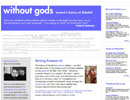 The following was posted on Sunday by Mitch Stephens on Without Gods (for those of you still unfamiliar with it, Without Gods is the public work diary for Mitch’s forthcoming history of atheism, which we’ve been hosting for the past eight months — wow, has it been that long?!).
The following was posted on Sunday by Mitch Stephens on Without Gods (for those of you still unfamiliar with it, Without Gods is the public work diary for Mitch’s forthcoming history of atheism, which we’ve been hosting for the past eight months — wow, has it been that long?!).
Thanks
The quality of the comments here lately has seemed, to me, extraordinarily high.
One of the purposes of blogging a book as it is being written is to have ideas tested and, possibly, sharpened, transformed or overturned. This has repeatedly occurred — although I have not often weighed in with comments of my own acknowledging that. Please take this as a blanket acknowledgement and expression of appreciation.
GAM3R 7H30RY may be flashier, and more technically ambitious, but in many ways Without Gods has been a more revelatory experiment in networked writing. As Mitch acknowledges, the sustained activity, and quality, of the comment streams has been impressive, and above all, interesting to read. It’s fascinating to follow this evolving collaboration between author and reader, and to watch Mitch come into his own as a skilled moderator of blog-based discussion. It remains to be seen how these conversations will end up shaping the finished book, but for some examples of a tangible collaboration taking place, take a look at these recent “Author Needs Advice” posts (part 1, part 2), in which Mitch asks for feedback on specific sections of the work-in-progress. Whatever the outcome, it’s clear that this reconfiguration of the writing process is yielding real rewards.
aggregator academica
Scott McLemee has made an interesting proposal for a scholarly aggregator site that would weave together material from academic blogs and university presses. Initially, this would resemble an enhanced academic blogroll, building on existing efforts such as those at Crooked Timber and Cliopatria, but McLemee envisions it eventually growing into a full-fledged discourse network, with book reviews, symposia, a specialized search engine, and a peer voting system á la Digg.
This all bears significant resemblance to some of the ideas that emerged from a small academic blogging symposium that the Institute held last November to brainstorm ways to leverage scholarly blogging, and to encourage more professors to step out of the confines of the academy into the role of public intellectual. Some of those ideas are set down here, on a blog we used for planning the meeting. Also take a look at John Holbo’s proposal for an academic blog collective, or co-op. Also note the various blog carnivals around the web, which practice a simple but effective form of community aggregation and review. One commenter on McLemee’s article points to a science blog aggregator site called Postgenomic, which offers a similar range of services, as well as providing useful meta-analysis of trends across the science blogosphere — i.e. what are the most discussed journal papers, news stories, and topics.
For any enterprise of this kind, where the goal is to pull together an enormous number of strands into a coherent whole, the role of the editor is crucial. Yet, at a time when self-publishing is the becoming the modus operandi for anyone who would seek to maintain a piece of intellectual turf in the network culture, the editor’s task is less to solicit or vet new work, and more to moderate the vast conversation that is already occurring — to listen to what the collective is saying, and also to draw connections that the collective, in their bloggers’ trenches, may have missed.
Since that November meeting, our thinking has broadened to include not just blogging, but all forms of academic publishing. On Monday, we’ll post an introduction to a project we’re cooking up for an online scholarly network in the field of media studies. Stay tuned.
a bone-chilling message to academics who dare to become PUBLIC intellectuals
Juan Cole is a distinguished professor of middle eastern studies at the University of Michigan. Juan Cole is also the author of the extremely influential blog, Informed Comment which tens of thousands of people rely on for up-to-the-minute news and analysis of what is happening in Iraq and in the middle east more generally. It was recently announced that Yale University rejected Cole’s nomination for a professorship in middle eastern studies, even after he had been approved by both the history and sociology departments. As might be expected there is considerable outcry, particularly from the progressive press and blogosphere criticizing Yale for caving in to what seems to have been a well-orchestrated campaign against Cole by the hard-line pro-Israel forces in the U.S.
Most of the stuff I’ve read so far seems to concentrate on taking Yale’s administration to task for their spinelessness. While this criticism seems well-founded, I think there is a bigger issue that isn’t being addressed. The conservatives didn’t go after Cole simply because of his political ideas. There are most likely people already in Yale’s Middle Eastern studies dept. with politics more radical than Cole’s. They went after him because his blog, which reaches out to a broad general audience is read by tens of thousands and ensures that his ideas have a force in the world. Juan once told me that he’s lucky if he sells 500 copies of his scholarly books. His blog however ranks in the Technorati 50 and through his blog he has also picked up influential gigs in Salon and NPR.
Yale’s action will have a bone-chilling effect on academic bloggers. Before the Cole/Yale affair it was only non-tenured professors who feared that speaking out publicly in blogs might have a negative impact on their careers. Now with Yale’s refusal to approve the recommendation of its academic departments — even those with tenure must realize that if they dare to go outside the bounds of the academy to take up the responsibilities of public intellectuals, that the path to career advancement may be severely threatened.
We should have defended Juan Cole more vigorously, right from the beginning of the right-wing smear against him. Let’s remember that the next time a progressive academic blogger gets tarred by those who are afraid of her ideas.
the networked book: an increasingly contagious idea
 Farrar, Straus and Giroux have ventured into waters pretty much uncharted by a big commercial publisher, putting the entire text of one of their latest titles online in a form designed to be read inside a browser. “Pulse,” a sweeping, multi-disciplinary survey by Robert Frenay of “the new biology” — “the coming age of systems and machines inspired by living things” — is now available to readers serially via blog, RSS or email: two installments per day and once per day on weekends.
Farrar, Straus and Giroux have ventured into waters pretty much uncharted by a big commercial publisher, putting the entire text of one of their latest titles online in a form designed to be read inside a browser. “Pulse,” a sweeping, multi-disciplinary survey by Robert Frenay of “the new biology” — “the coming age of systems and machines inspired by living things” — is now available to readers serially via blog, RSS or email: two installments per day and once per day on weekends.
Naturally, our ears pricked up when we heard they were calling the thing a “networked book” — a concept we’ve been developing for the past year and a half, starting with Kim White’s original post here on “networked book/book as network.” Apparently, the site’s producer, Antony Van Couvering, had never come across if:book and our mad theories before another blogger drew the connection following Pulse’s launch last week. So this would seem to be a case of happy synergy. Let a hundred networked books bloom.
The site is nicely done, employing most of the standard blogger’s toolkit to wire the book into the online discourse: comments, outbound links (embedded by an official “linkologist”), tie-ins to social bookmarking sites, a linkroll to relevant blog carnivals etc. There are also a number of useful tools for exploring the book on-site: a tag cloud, a five-star rating system for individual entries, a full-text concordance, and various ways to filter posts by topic and popularity.
My one major criticism of the Pulse site is that the site is perhaps a little over-accessorized, the design informed less by the book’s inherent structure and themes than by a general enthusiasm for Web 2.0 tools. Pulse clearly was not written for serialization and does not always break down well into self-contained units, so is a blog the ideal reading environment or just the reading environment most readily at hand? Does the abundance of tools perhaps overcrowd the text and intimidate the reader? There has been very little reader commenting or rating activity so far.
But this could all be interpreted as a clever gambit: perhaps FSG is embracing the web with a good faith experiment in sharing and openness, and at the same time relying on the web’s present limitations as a reading interface (and the dribbling pace of syndication — they’ll be rolling this out until November 6) to ultimately drive readers back to the familiar print commodity. We’ll see if it works. In any event, this is an encouraging sign that publishers are beginning to broaden their horizons — light years ahead of what Harper Collins half-heartedly attempted a few months back with one of its more beleaguered titles.
I also applaud FSG for undertaking an experiment like this at a time when the most aggressive movements into online publishing have issued not from publishers but from the likes of Google and Amazon. No doubt, Googlezon’s encroachment into electronic publishing had something to do with FSG’s decision to go ahead with Pulse. Van Couvering urges publishers to take matters into their own hands and start making networked books:
Why get listed in a secondary index when you can be indexed in the primary search results page? Google has been pressuring publishers to make their books available through the Google Books program, arguing (basically) that they’ll get more play if people can search them. Fine, except Google may be getting the play. If you’re producing the content, better do it yourself (before someone else does it).
I hope tht Pulse is not just the lone canary in the coal mine but the first of many such exploratory projects.
Here’s something even more interesting. In a note to readers, Frenay talks about what he’d eventually like to do: make an “open source” version of the book online (incidentally, Yochai Benkler has just done something sort of along these lines with his new book, “The Wealth of Networks” — more on that soon):
At some point I’d like to experiment with putting the full text of Pulse online in a form that anyone can link into and modify, possibly with parallel texts or even by changing or adding to the wording of mine. I like the idea of collaborative texts. I also feel there’s value in the structure and insight that a single, deeply committed author can bring to a subject. So what I want to do is offer my text as an anchor for something that then grows to become its own unique creature. I like to imagine Pulse not just as the book I’ve worked so hard to write, but as a dynamic text that can continue expanding and updating in all directions, to encompass every aspect of this subject (which is also growing so rapidly).
This would come much closer to the networked book as we at the institute have imagined it: a book that evolves over time. It also chimes with Frenay’s theme of modeling technology after nature, repurposing the book as its own intellectual ecosystem. By contrast, the current serialized web version of Pulse is still very much a pre-network kind of book, its structure and substance frozen and non-negotiable; more an experiment in viral marketing than a genuine rethinking of the book model. Whether the open source phase of Pulse ever happens, we have yet to see.
But taking the book for a spin in cyberspace — attracting readers, generating buzz, injecting it into the conversation — is not at all a bad idea, especially in these transitional times when we are continually shifting back and forth between on and offline reading. This is not unlike what we are attempting to do with McKenzie Wark’s “Gamer Theory,” the latest draft of which we are publishing online next month. The web edition of Gamer Theory is designed to gather feedback and to record the conversations of readers, all of which could potentially influence and alter subsequent drafts. Like Pulse, Gamer Theory will eventually be a shelf-based book, but with our experiment we hope to make this networked draft a major stage in its growth, and to suggest what might lie ahead when the networked element is no longer just a version or a stage, but the book itself.
